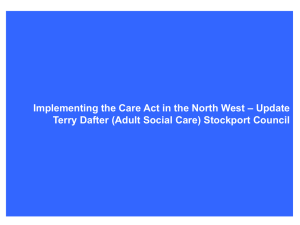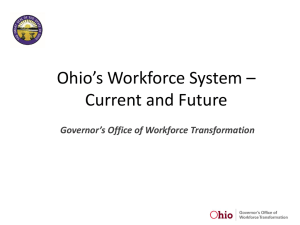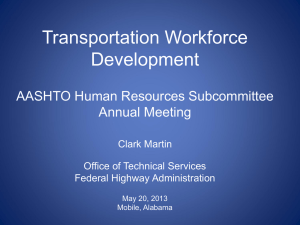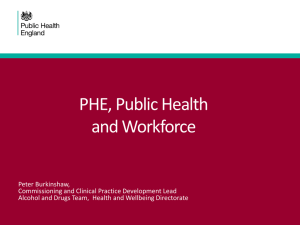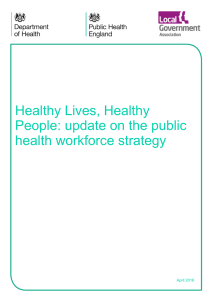PowerPoint Presentation - Wessex Public Health Network
advertisement
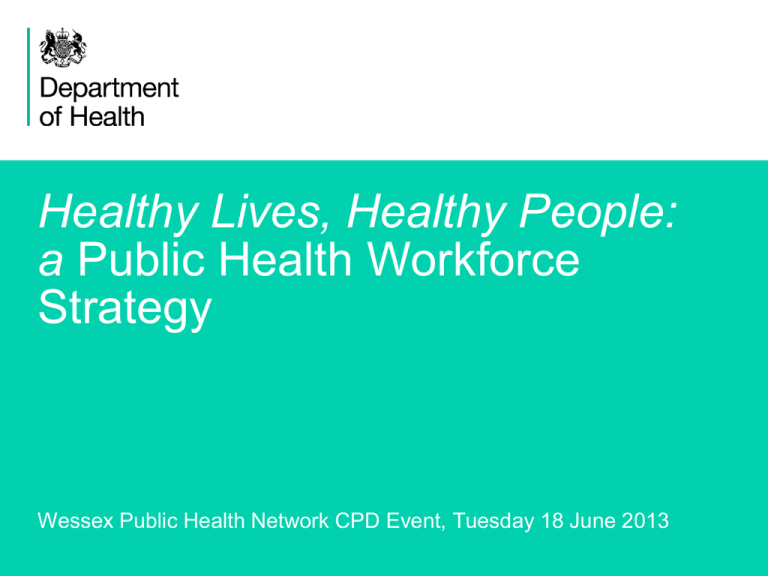
Healthy Lives, Healthy People: a Public Health Workforce Strategy Wessex Public Health Network CPD Event, Tuesday 18 June 2013 1 A Public Health Workforce Strategy White Paper Healthy Lives Healthy People (2010) gave commitment to develop a PH workforce strategy for consultation DH Working Group includes members from the FPH, BMA, LGA, DCLG, RCN, the Deaneries, HPA as well as DH policy officials. Consultation from 27 March - 29 June 2012: sought views on the content of a public health workforce strategy – nearly 250 responses Consultation had an inclusive approach and was jointly branded with the Local Government Association 2 Key themes from consultation responses • a more explicit link to the Public Health Outcomes Framework; • the balance between national leadership and local delivery; • further clarity on the public health workforce roles and responsibilities of key organisations in the new system; • potential career pathways for public health describing the different entry points and opportunities for provider workforces; • building on the role of the wider local authority workforce; • issues such as regulation of the public health workforce and medical revalidation. 3 Key commitments • LGA advice and guidance dealing with ideas for local innovation in workforce development and the alignment of skills with local community priorities • review of the Public Health Skills and Career Framework that will be used to develop a new skills passport for public health • the PHORCaST website will migrate to Health Education England and be developed as an interactive website • a minimum dataset for the public health workforce to support workforce planning for public health specialists and the wider public health workforce 4 Key commitments (contd) • PHE will support and develop its non medical scientific workforce, linking with the Modernising Scientific Careers Programme • DH will extend statutory regulation to non-medically qualified public health specialists • Health Education England (HEE) will lead on workforce planning, education and training with professional advice from PHE • PHE will work with HEE to identify a lead LETB for public health • A review of the Faculty’s curriculum for the national public health specialty training programme 5 Key commitments (contd) • Councils and the LGA will work closely with DH and PHE and other colleagues in the public health system, including the NHS Leadership Academy (NHSLA) to co-design and develop leadership programmes • PHE, in partnership with local authorities and other key stakeholders, will lead the development of the knowledge and information workforce at national and local level • PHE’s Chief Knowledge Officer will lead on developing academic public health capacity for PHE • academic competencies should be given appropriate weighting and the lead LETB for public health will identify and promote high quality academic training placements 6 Conclusion The commitments in this strategy will enable us to: o Understand our workforce better o Focus on the workforce development role of local authorities o Give a clearer road map for future career pathways and skills development o Give greater reassurance on the competence and professionalism of all public health specialists o Improve connections between commissioners of education and training and the end-users o Promote leadership skills and o Embed public health knowledge and capacity across the healthcare system 7 Next steps • The commitments will be taken forward by the range of organisations as set out in the strategy • PHE Deputy Director of Professional Workforce Development – Kathryn Rowles • PHE Professional Leadership Forum jointly chaired by the Medical Director/Director of Health Protection and Director of Nursing • DH retains oversight of strategy implementation • DH, PHE and the LGA will monitor implementation of the strategy and, in partnership with stakeholders, review and if necessary update it in 2015. 8





